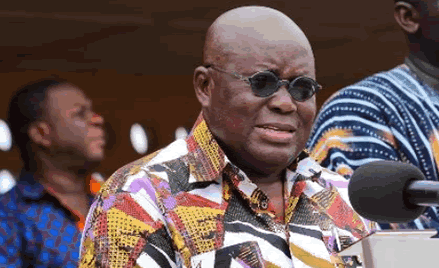Government makes agricultural modernization urgent priority – President

President Nana Addo Dankwa Akufo-Addo has underlined the government’s determination to pursue aggressive modernization of the nation’s agriculture to substantially increase productivity and reduce food import.
He said its agenda for the next four years was to transform agriculture by improving production efficiency and ensuring increased returns to the farmer.
President Nana Akufo-Addo was performing the ceremony to mark the commencement of work on a 1,000 metric ton capacity warehouse at Ejura in the Ejura-Sekyedumase Municipality.
This coincided with the celebration of the 37th World Food Day, which was on the theme “Change the future migration – Invest in food security and rural development”.
He said they were eager to provide storage facilities to reduce post-harvest losses, promote agro-processing, efficient packaging and transportation of agricultural produce.
There would also be access to credit by farmers and the supply of inputs to transform their lives.
President Nana Akufo-Addo added that the government would forge strong partnership with United Nations’ World Food Programme (WFP) and the Food and Agricultural Organization (FAO) to enhance the agricultural value chain.
The warehouse is a component of the Infrastructure for Poverty Eradication Programme (IPEP), an initiative, designed to boost infrastructural development, particularly in rural and deprived communities.
Under it, each of the 275 constituencies across the country would receive US$1 million every year, to be invested in infrastructure development.
President Nana Akufo-Addo said this tied in with the medium term development plans of the decentralized assemblies, adding that, small-water systems and health facilities would also be expanded.
The IPEP would see to the construction of more warehouses to assist prevent post-harvest losses – a major problem affecting agricultural production and food security.
The President said his government’s agricultural policies and interventions were aimed at lifting the smallholder farmer out of poverty.
Mr. Abebe Haile Gabriel, the FAO Representative to Ghana, stated that for developing countries where the majority of the population earned their livelihoods from agriculture, transforming the sector within the context of a dynamic rural sector could be “very beneficial”.
It was the way forward to halt migration of the productive youth to the urban areas, while ensuring an end to hunger and malnutrition.
Studies reveal that there were 244 million international migrants in 2015, 40 per cent more than in 2000, while an estimated 763 million people, mostly from the rural areas, also moved within national borders in 2013.
Ms. Ruth Yacoub, the WFP Representative and Country Director, said they were working with the Food and Agriculture Ministry and the district assemblies in the Northern Region on an asset creation programme to stop internal migration of people from food producing areas.
It had since the last five years, assisted the people to construct small dams, dug-outs, fish ponds and other community assets which they needed to enable them work and earn income all-year round.
Ms. Yacoub said it had aided the construction of about 300 small dams and dug-outs together with 16 fish ponds and the planting of over 8, 000 trees.
Source: GNA
